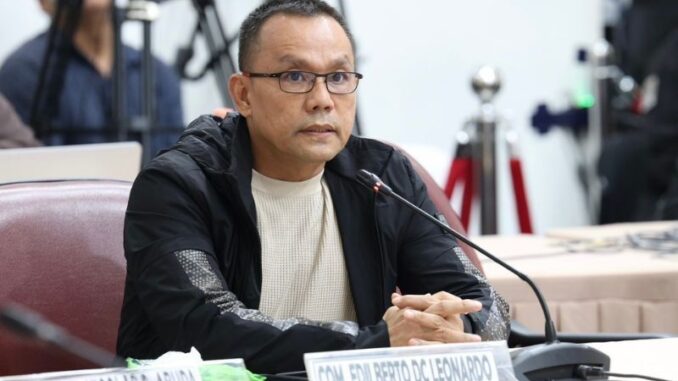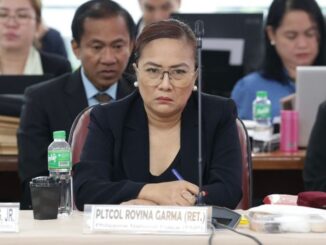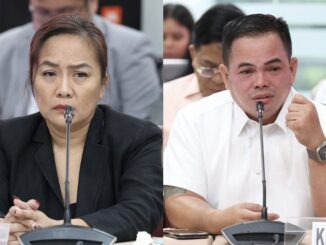
MANILA, Philippines — Retired police colonel Edilberto Leonardo, who had repeatedly denied that the Duterte administration implemented a reward system for its war on drugs, acknowledged its existence at the House Quad Committee’s ninth hearing.
However, the resigned police commissioner remained tight-lipped about the details.
After the lengthy public hearing on Tuesday, October 22, Rep. Bienvenido Abante (Manila, 6th District) asked Leonardo if he “believed” retired Davao police officer Royina Garma’s claims that the police officers were rewarded for killing drug suspects.
“This is my question, and this will only be answerable [by] yes or no. I am not going to ask [for] any more explanation, Colonel Leonardo. … Regarding the two affidavits of Colonel Garma that you have read and heard, do you believe in them?” Abante asked in a mix of English and Filipino.
“Yes, Mr. Chair,” Leonardo answered.
When Abante sought clarification on whether he believed a reward system existed, Leonardo was initially hesitant to answer either yes or no. He reiterated his previous statements, saying he had only “heard” about it but had no personal knowledge.
Although Abante pressed him, which eventually led to Leonardo saying “Yes, Mr. Chair.”
What else did Leonardo bare?
Confirmation of the reward system, known as the “Davao Model,” came after Garma bared to the House joint committee that she had referred Leonardo, her upperclassman, to former President Rodrigo Duterte to implement the model on a national scale.
Garma claimed that police officers were paid between P20,000 and P1 million for each drug suspect killed.
In her second affidavit, she revealed her personal knowledge of the “Davao Death Squad,” or DDS, from her time assigned in Davao, including the direct payments of P5,000 and P20,000 received by station commanders, including herself for drug suspects killed.
This was consistent with the findings of the Commission on Human Rights regarding the DDS reward system, as presented by former Sen. Leila de Lima on Tuesday.
RELATED: De Lima: ‘Davao Model’ resembles Davao Death Squad’s reward system
She also said it was Leonardo who organized the task force and developed a proposal detailing the operational structure, which is information she received directly from him.
Leonardo’s corroboration. Asked whether it was true that he had contacted Garma, Leonardo said that he did ask her to join the task force. However, she declined, corroborating Garma’s testimony.
Lawmakers repeatedly asked Leonardo about the task force’s operations and the proposal he submitted to Sen. Bong Go, but he maintained that it was not approved because it was “in conflict” with Sen. Ronald “Bato” dela Rosa’s Double Barrel or Oplan Tokhang.
He said his proposal aimed to intensify the war on drugs campaign, explaining that implementing both would result in duplication of efforts. Leonardo, however, did not explain the difference between the two plans.
Leonardo was also asked if he recognized the five “trusted personnel” named by Garma in her affidavit, who were responsible for gathering information on the arrests or deaths of drug personalities and relaying it to him.
These individuals were Lester Berganio, Rommel Bactat, Rodel Cerbo, Michael Palma and Peter Parungo.
Parungo was allegedly responsible for managing the bank accounts used for rewards and reimbursements related to operational expenses for drug suspects killed.
Leonardo said he knew them but did not clarify their involvement in the task force to the House mega panel. He only said that Parungo and Berganio were civilians who worked as “strikers,” taking orders from police officers for menial tasks.
He confirmed that the other three individuals were police personnel from the Criminal Investigation and Detection Group (CIDG) of Region 11, where Leonardo served as police chief.
Show cause orders. Three of the said “trusted personnel” — Parungo, Bactat and Palma — received a show cause order alongside Irmina Espino, a close aide to Go, who was reportedly the “Muking” that contacted Garma for Leonardo’s contact information. Police officer Sonny Buenaventura, alleged to be one of the leaders of the death squad, was also issued a show cause order.
In her supplemental affidavit, Garma mentioned Espino and Buenaventura as individuals responsible for disbursing funds to police commanders for reimbursing operational expenses and rewarding killings.
Leonardo’s changed demeanor
House Quad Comm co-chairs also noted how Leonardo had immediately changed his answer in a matter of hours, first denying the reward system and then later confirming it. He was also seen tightly gripping his arms every now and then.
Rep. Robert Ace Barbers (Surigao del Norte, 2nd District) and Rep. Dan Fernandez (Santa Rosa, Lone District) said this indicates Leonardo’s “confusion.”
“His reply to the question showed… that he seemed confused, which only indicates that he was under no pressure,” Barbers stated during a virtual press conference on Wednesday, October 22, mixing English and Filipino.
Fernandez also speculated that Leonardo might have been “tired” after being interrogated late at night, several hours into the hearing. He said that Leonardo may be concerned about his family in Davao, highlighting the former police chief’s hesitance.
“He is trying to balance things in relation to the protection of his family,” he added in Filipino.
The House Quad Committee invited Duterte as a resource person to address the allegations against him. However, he was absent on Tuesday, citing health issues according to his legal counsel.





Be the first to comment